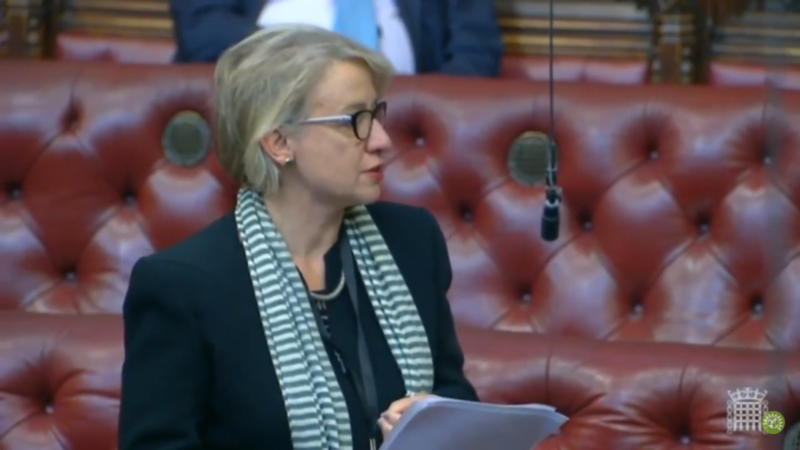Why is it left to the unelected chamber to defend abandoned Brits? The Green peer looks at this week's Lords agenda.

Natalie Bennett is a Green Party peer and a Contributing Editor to Left Foot Forward.
This week, two large groups of Brits entirely failed by the political system are going to be relying on the House of Lords to stand up for them.
Through the Financial Services Bill (for mortgage prisoners) and the Fire Safety Bill (for leaseholder victims of the cladding and building safety scandal), the House is engaged with what is known as “ping pong” with the government-dominated Commons. That’s a friendly-sounding name for decisions that will affect many thousands of people’s lives – people trapped in often desperate financial situations through no fault of their own.
The question is whether the House will stand firm, or fall behind the standard line of being the “unelected House” and therefore unable to do the right thing when the Commons will not.
Although there’s also a bigger question to be asked: why is our current regulatory framework, our economic system and governance, failing so badly to ensure that society works fairly, equitably, and in the case of building construction, safely?
Wrongful convictions
There’s a third group of people that also belong in this group, victims of injustice and system failure for whom many of the House of Lords have been fighting for years. That’s the 39 postmasters unjustly convicted of fraud, whose convictions have just been quashed by the Court of Appeal. It’s a judgement that should allow them to achieve at least some compensation for their years of trauma, loss of reputation and financial hardship.
In total 736 people were prosecuted by the Post Office based on the, it is now accepted, utterly faulty computer system, developed through – you guessed it – outsourcing. Many Lords were campaigning on the issue, asking questions, challenging the government, but it took court action to finally clear up the mess.
Fire warning
First up on Tuesday will be the Fire Services Bill. The Bishop of St Albans has been the leader on the Lords amendment to see that: “The owner of a building may not pass the costs of any remedial work attributable to the provisions of this Act on to leaseholders or tenants of that building.” How many people live in buildings affected by the safety scandal is unknown, even to the government, but it is certainly hundreds of thousands.
Behind the dry legal language of the amendment is a world of human suffering and pain. As the Bishop told our last debate on the Bill, he was being stopped in the street by people affected thanking him for his efforts.
No wonder. Publications are filled with stories of leaseholders, often recent purchasers of new flats, who’d saved and scrimped for a deposit, and who face bills of tens of thousands of pounds to remedy faults in their building. These are failings that often extend far beyond cladding to the basic structures of their buildings.
Many are having to pay for, and live with, “walking watches”: people paid to patrol their homes continually because they’re judged so dangerous. Some have even been forced out of their homes without notice.
Mortgage prisoners
Then on Wednesday, it will be the Financial Services Bill. There’s an amendment rejected by the Commons that I’ve long been working on, based on work by Macmillan Cancer Support, that financial sector companies should have a duty of care for their customers (something I’ve argued should be extended to society as a whole). But most attention will be on the “mortgage prisoners” amendment – seeking to help victims of the 2007-8 financial crash, people who just happened to have their mortgage with the “wrong” company.
There are an estimated quarter of a million people affected. Many are paying high rates of 4 or 5% on their mortgage – windfall profits to the financial sector. Some are being bled at 9% rates by vultures, while typical rates for most, untrapped, mortgages are around 1.5%.
Let’s look at what this means. People being failed by the regulatory and legal systems are relying on the unelected house = the product of medieval hereditary rights and 18th-century style patronage, with a touch of theocracy, while being abandoned by the MPs supposedly representing them. It can only be taken as overwhelming evidence that we need to make the UK a democracy, with two Houses of Parliament democratically elected reflecting the will of the people, and an effective, functional system of governance.
These are financial scandals, justice scandals, scandals arising from a few taking massive profits while the rest of us pay.
We have a political system working for those profiteers. And those profiteers are paying for the politicians currently running the country.
To reach hundreds of thousands of new readers we need to grow our donor base substantially.
That's why in 2024, we are seeking to generate 150 additional regular donors to support Left Foot Forward's work.
We still need another 117 people to donate to hit the target. You can help. Donate today.



